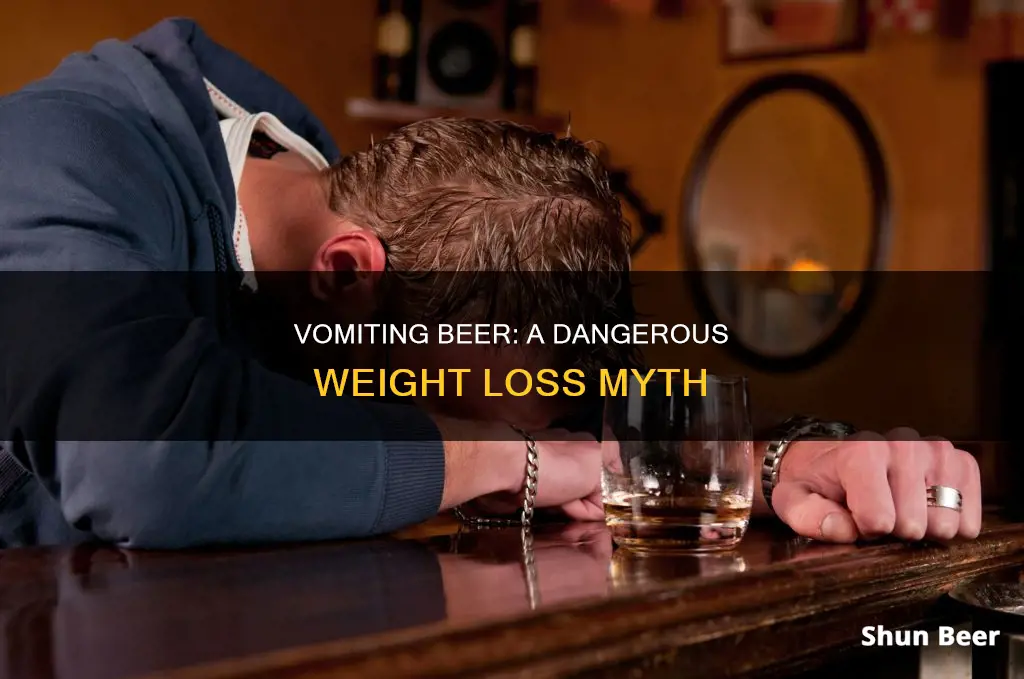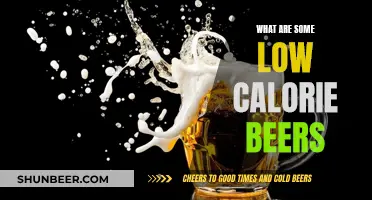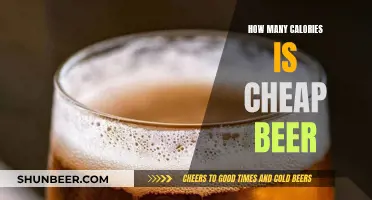
Beer is a popular alcoholic beverage, but it can be a concern for those watching their weight. Alcoholic drinks are known to be high in calories, and beer is no exception. While it is possible to lose some calories by throwing up beer, this is not a healthy or recommended practice. Vomiting can cause damage to the body, including tooth enamel and gum erosion, dehydration, and potential perforation of the oesophagus. It is also unsafe to assume that all the calories from the beer will be expelled through vomiting, as the body can still absorb calories from the drink before it is thrown up. Therefore, it is not a good idea to rely on throwing up as a method for losing calories from beer consumption. Instead, individuals concerned about their weight and beer consumption should consider reducing their overall beer intake, opting for lower-calorie beers, or drinking in moderation.
Is it better to throw up beer to lose calories?
| Characteristics | Values |
|---|---|
| Losing calories | If you throw up immediately after drinking beer, you will lose some calories. However, this is not a healthy or recommended practice. |
| Health risks | Throwing up beer can cause damage to your tooth enamel and gums, dehydration, and erosion or perforation of the esophagus. |
| Weight loss | Forgoing alcohol is ideal for losing weight. Beer contains empty calories and can increase your appetite, making weight loss more challenging. |
| Alternatives | If you want to lose weight, it is recommended to limit your alcohol intake, drink light or low % ABV beer, reduce your portion size, and drink less frequently. |
What You'll Learn
- Beer is high in calories, with a typical beer containing 150 calories
- Alcohol calories are easily overdone, leading to a calorie overload
- Alcohol increases your appetite, and you tend to eat more unhealthy foods
- Drinking less alcohol is a good way to tackle belly fat
- Excessive drinking can lead to health problems like liver damage

Beer is high in calories, with a typical beer containing 150 calories
Craft beers, seasonal beers, and beers with higher alcohol content tend to have more calories. For example, a 12-ounce IPA can have over 300 calories, while the average IPA has about 180 to 200 calories. Lagers typically have fewer calories than ales, and ales have fewer calories than stouts, but there are exceptions.
If you are concerned about calorie intake and weight loss, it is generally recommended to avoid alcohol altogether. However, if you choose to drink, it is important to be mindful of the type and amount of beer you consume. Opting for light beers or non-alcoholic beers can help reduce your calorie intake. Additionally, drinking in moderation, drinking water between alcoholic beverages, and being mindful of food choices can also help.
It is important to note that vomiting, including throwing up beer, can cause damage to your body, including your tooth enamel, gums, and esophagus. While it may seem like a quick fix to reduce calorie intake, it is not a recommended practice. The calories from beer are absorbed into your bloodstream, so throwing up will not eliminate all the calories consumed. The timing of vomiting in relation to drinking can impact how many calories are absorbed, but it is not an exact ratio or formula.
Calorie Counting: Saison Beer's Nutritional Secrets Revealed
You may want to see also

Alcohol calories are easily overdone, leading to a calorie overload
Alcohol contains empty calories and doesn't provide any nutrients to your body. These empty calories have no nutritional value because they are consumed in addition to the calories your body needs. A pint of lager contains roughly the same amount of calories as a standard slice of pizza, and a large glass of wine (250ml) has the same amount as a typical ice cream sundae. Alcohol also affects the way your body processes fat for energy. This is because while your body can store many nutrients, protein, carbohydrates, and fat, it needs to prioritize getting rid of the alcohol, which is toxic and interrupts all the other processes that should be taking place, like absorbing nutrients and processing fat.
Alcohol has almost the same amount of calories as fat and is the second most calorie-dense macronutrient. It has 7 calories per gram, making it higher in calories than most people realize. This means a 1.5-ounce jigger of vodka has almost 100 calories. And the calories in an alcoholic drink aren't just from the alcohol—many drinks are also high in sugar. For example, a Long Island Iced Tea has about 500 calories in one 8-ounce glass, more than a double cheeseburger from McDonald's.
Drinking alcohol can also increase your appetite and make you more likely to make poor food choices. Research has found that alcohol decreases fat burn, especially in the belly, which is why a "beer belly" is more common than "beer hips." Alcohol can also lead to dehydration, which can make you feel hungrier.
If you're trying to lose weight, it's a good idea to limit your drinking. The NHS recommends an average of 2,000 calories (kcal) a day for women and 2,500 calories a day for men to maintain a healthy body weight. For adults who drink alcohol habitually, nearly 10% of their daily calorie intake comes from alcohol. To avoid these extra calories, stick to low-risk drinking guidelines, such as no more than 14 units of alcohol a week for both men and women, with several drink-free days and no binging.
Calories in Beer: Understanding the Nutritional Breakdown
You may want to see also

Alcohol increases your appetite, and you tend to eat more unhealthy foods
Throwing up after drinking beer will likely not benefit your health and may even be harmful. While it is true that you will be free of the calories from the beer you threw up, it is not a recommended practice. As one source states, "you are basically initiating your body's emergency evacuation system to being seriously poisoned." Throwing up can cause damage to your tooth enamel and gums, dehydration, and erosion or perforation of the esophagus. People have even died from being black-out drunk and aspirating on their own vomit.
Alcohol is calorie-dense, with ethanol providing about 7 calories per gram, which is more than carbohydrates or protein (4 calories per gram) and less than fat (9 calories per gram). Alcohol is also known to stimulate appetite and increase energy intake. Several factors may contribute to this, including the suppression of fatty acid oxidation, increased thermogenesis, and stimulation of neurochemical systems that regulate appetite. Alcohol also affects the hormones that regulate hunger, such as leptin and GLP-1, which are inhibited when alcohol enters the body, leading to increased feelings of hunger.
In addition, alcohol is often associated with eating less healthy foods. The more alcohol you consume, the more likely you are to make poor food choices. This may be due to the reduction in self-control that occurs with drinking, as well as the direct physiological effects of alcohol on appetite stimulation. For example, alcohol may stimulate nerve cells in the brain's hypothalamus that increase appetite and trigger extreme hunger sensations.
Furthermore, drinking alcohol can impact your metabolism and make weight loss more challenging. Alcohol contains empty calories and does not provide any nutrients to the body. It can also cause a water weight increase, leading to a higher number on the scale.
Therefore, if you are concerned about your weight, it is best to limit your alcohol intake or forgo it altogether. You can try to stick to healthier, less calorie-dense foods when drinking, as alcohol itself is already very calorie-dense. Drinking water or alternating between alcoholic and non-alcoholic drinks can also help to pace yourself, feel more full, and reduce the risk of making poor food choices.
Calories in Leinenkugel's Cranberry Ginger Beer: A Healthy Treat?
You may want to see also

Drinking less alcohol is a good way to tackle belly fat
Throwing up after drinking beer will not benefit your health. It can cause damage to your tooth enamel and gums, dehydration, and erosion or perforation of the esophagus. It is also not an effective way to lose weight, as you will still absorb the calories from the drinks that were not in your stomach when you threw up.
Alcohol can also negatively impact your organs, particularly the liver, which plays a crucial role in metabolising and storing carbohydrates and fats. Excess alcohol consumption can lead to alcoholic fatty liver, which can damage your liver and affect your body's ability to metabolise and store energy from food, making weight loss more difficult.
Additionally, alcohol can increase your appetite and lower your inhibitions, leading to poor food choices and increased calorie intake. It can also affect your sleep, causing increased periods of wakefulness during sleep cycles, which can lead to an imbalance in hormones related to hunger, satiety, and energy storage.
To tackle belly fat, it is recommended to reduce your overall calorie intake, increase physical activity, and make healthier food and drink choices. Light beers or low-calorie alcoholic mixers can be good alternatives if you want to drink but still keep your calorie intake in check.
Ginger Beer: Low-Calorie, Healthy Fizz or Just a Myth?
You may want to see also

Excessive drinking can lead to health problems like liver damage
Excessive drinking can lead to serious health problems, including liver damage. Alcohol-related liver disease (ARLD) is caused by excess alcohol intake and can result in permanent damage to the liver. The liver is a complex organ with many vital functions, including filtering toxins from the blood, aiding digestion, regulating blood sugar and cholesterol levels, and helping fight infection. Each time the liver filters alcohol, some liver cells die, and while the liver can regenerate, prolonged alcohol misuse can reduce its ability to recover.
ARLD typically doesn't cause symptoms until the liver has been severely damaged. When symptoms do occur, they may include jaundice (yellowing of the eyes or skin), swelling in the ankles and abdomen, confusion or drowsiness, and vomiting blood or passing blood in stools. ARLD is often diagnosed during tests for other conditions or at an advanced stage of liver damage.
There are several stages of ARLD, including alcoholic fatty liver disease, alcoholic hepatitis, and cirrhosis. Fatty liver disease is the initial stage, characterized by a build-up of fat in the liver, and usually doesn't cause symptoms. However, it is a warning sign that an individual is drinking at a harmful level. This stage is reversible by abstaining from alcohol for an extended period, typically months or years.
Alcoholic hepatitis is a potentially serious condition that can occur from alcohol misuse over a longer period or binge drinking. Mild alcoholic hepatitis causes slow liver damage over many years, while severe alcoholic hepatitis can be life-threatening and sudden. The liver damage associated with mild alcoholic hepatitis is usually reversible with permanent abstinence from alcohol. However, severe alcoholic hepatitis may require a liver transplant.
Cirrhosis is the most advanced stage of ARLD, where the liver has become significantly scarred. This stage is generally irreversible, but stopping alcohol consumption immediately can prevent further damage and increase life expectancy. In severe cases, a liver transplant may be necessary if the liver has stopped functioning and doesn't improve with abstinence.
To prevent ARLD, it is crucial to stop drinking alcohol or stick to recommended limits. Men and women are advised not to regularly exceed 14 units of alcohol per week, and it is recommended to spread drinking over three or more days if consuming the weekly limit. Abstaining from alcohol or reducing intake will have short-term and long-term benefits for liver health and overall health.
Calorie Counting Beer-Battered Chicken: How Many Calories?
You may want to see also
Frequently asked questions
No, it is not better to throw up beer to lose calories. Throwing up can cause damage to your tooth enamel and gums, dehydration, and erosion or perforation of the esophagus. It is also not a reliable way to reduce calorie intake, as the calories from alcohol are absorbed quickly.
A typical beer has around 150 calories, but this can vary depending on the type of beer and its ABV (alcohol by volume). Light beers tend to have fewer calories, with some containing 100 calories or less.
Beer can contribute a lot of calories, especially if consumed in large quantities. The high calorie content, combined with the tendency for alcohol to increase appetite, can lead to excess calorie intake and weight gain.
Yes, there are lower-calorie alcoholic beverage options, such as light beer, dry vermouth, or champagne. However, the best option for weight loss is to reduce overall alcohol consumption and opt for non-alcoholic beverages.
Drinking beer for weight loss can be challenging due to the high calorie content and the lack of mandatory calorie labeling on beer containers. Additionally, alcohol can impact metabolism and make weight loss more challenging. It is also important to consider the health risks associated with excessive alcohol consumption, including liver damage and other serious health problems.







